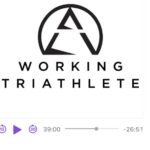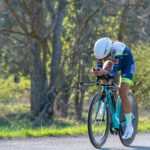What two things do these triathletes have in common: Lucy Charles-Barkley, Jan Frodeno, Kat Mathews, Taylor Knibb, Sam Laidlow, Ruth Astle, and, well, Jim Taylor (athletic giftedness is not one of them for the last guy on the list!)? They all have sustained serious injuries that kept them away from our sport for an extended period, and all came back fitter and faster than before and turned in exceptional race results post-injury.
My next question is: How is this possible? As the author of two books on the psychology of sports injury who regularly works with seriously injured athletes on the mental side of their rehabilitation and return to  sport, this is a question that I’ve been studying for years. Also, back in September, 2021, I was hit by a car on a training ride and sustained some serious injuries that kept me on crutches for almost two months. I experienced first-hand the physical and psychological challenges of trying to return to and surpass my pre-injury level of fitness, performance, and results.
sport, this is a question that I’ve been studying for years. Also, back in September, 2021, I was hit by a car on a training ride and sustained some serious injuries that kept me on crutches for almost two months. I experienced first-hand the physical and psychological challenges of trying to return to and surpass my pre-injury level of fitness, performance, and results.
Though getting injured is in no way desirable or wished for, I would suggest that the experience of getting injured and the process of rehabilitation has many benefits that result in returning to our sport better prepared physically and mentally to perform better and achieve greater success. Here are eight benefits that can make you a better triathlete (and person).
Rest
On the upside, triathletes love to train and push themselves to their physical limits. On the downside, triathletes aren’t noted for listening to their bodies or allowing sufficient time for rest and recovery. Particularly for triathletes who have been training and competing for many years, that effort can take its toll, both physically and psychologically. Being forced to step away from high levels of volume and intensity during rehabilitation can allow the body to rest and heal at a very deep level. It can also help triathletes to reconnect with the “why” that fuels their triathlon life, thus producing renewed physical energy and mental vigor upon their return to the sport that we all love so much.
toll, both physically and psychologically. Being forced to step away from high levels of volume and intensity during rehabilitation can allow the body to rest and heal at a very deep level. It can also help triathletes to reconnect with the “why” that fuels their triathlon life, thus producing renewed physical energy and mental vigor upon their return to the sport that we all love so much.
Time
The life of a triathlete, whether a top pro or a committed age grouper, is busy. Between training, work, family, and other aspects of life (if triathletes are lucky to have a life outside of triathlon!), there aren’t many extra hours in the day. What this often means is that some aspect of triathlon performance, often that triathletes aren’t even aware of, is neglected. One of the great “luxuries” of being injured is all the time that it frees up to devote to those areas in need of attention.
 Three area of triathlon performance can be focused on with this free time. First, building on your strengths. Second, improving on your weaknesses. And third, identifying and developing neglected areas of performance.
Three area of triathlon performance can be focused on with this free time. First, building on your strengths. Second, improving on your weaknesses. And third, identifying and developing neglected areas of performance.
We saw Lucy Charles-Barkley’s extra time put to great use after she sustained her hip injury in 2022. Once her recovery had progressed, Lucy visited the Red Bull Athlete Performance Center in Austria. While there, Lucy was put through a detailed physical assessment that uncovered the underlying causes of her stress fracture. During her rehabilitation, Lucy was able to strengthen these areas so that she is less likely to sustain a similar injury in the future. Just as importantly, Lucy’s efforts resulted in improved strength, mobility, and balance that, in turn, made her a faster triathlete that ultimately led her to winning the 2023 World Ironman Championships.
Essential Mental Tools
As every triathlete knows, our sport doesn’t just get us into exceptional physical condition. Rather, it also strengthens our minds that we can then use to go faster and farther on course and to perform better and be happier in our personal and professional lives.
Being injured and having to endure a long rehabilitation and return to sport also teaches powerful mental tools that can benefit you when you finally get back in the pool, on the bike, into your running shoes. To allow your injured body to heal and to put in your best effort in what can feel like interminably long and painful rehab sessions and gym workouts as you return to health, you need some very specific mental tools:
tools that can benefit you when you finally get back in the pool, on the bike, into your running shoes. To allow your injured body to heal and to put in your best effort in what can feel like interminably long and painful rehab sessions and gym workouts as you return to health, you need some very specific mental tools:
- Patience to resist your desire to rush back to our sport.
- Controlling the controllables when so much of injury recovery is outside of your control.
- Maintaining equanimity in the face of the inevitable ups and downs of recovery from injury.
- Staying motivated to do the work necessary to heal and rehab.
- Learning to give your fullest focus and effort in rehab consistently.
- Responding positively to the uncertainty and stress of being injured and forced to go through rehabilitation.
- Increasing your tolerance for pain.
Life Balance
Let’s be honest. The life of a serious triathlete is anything but balanced. There’s training, some work, more training, some family, more training, some sleep, some racing, and on and on. In other words, most triathletes lead an imbalanced life (not a bad thing necessarily). Injuries force you to get some balance  back into your life. Yes, rehab can take up time, but, all of a sudden, you have more time to work, be with your family, engage in neglected hobbies, and have the freedom to do whatever you want for a change.
back into your life. Yes, rehab can take up time, but, all of a sudden, you have more time to work, be with your family, engage in neglected hobbies, and have the freedom to do whatever you want for a change.
Following his hip injury in 2022, Jan Frodeno was able to regain some balance in his otherwise imbalanced life. He talked about the joy of spending time with his family, recommitting himself to being more present with his wife (the 2008 Olympic triathlon gold medalist Emma Snowsill) and his two children. Jan also spoke of the satisfaction he has felt in devoting more energy to his charitable interests.
Triathlon in Perspective
Passionate triathletes tend to be an all-or-nothing lot. As a result, it’s easy to lose perspective and pour your entire self-identity into being a multisport athlete. This deep dive into our sport can mean a lot of meaning, gratification, and joy in your efforts. At the same time, when things go bad, like with an injury, that narrow perspective and lop-sided self-identity can be a problem. I have an adage I often use with athletes who may have lost perspective on the role that sports play in their lives: “Sports should be a part of life, not life itself.” Thought of another way, triathlon should be a significant part of your self-identity, but not the most dominant part (in the grand scheme of things, family, friends, and career should be more important, even though they often don’t feel that way).
Kat Matthews has spoken openly about her self-identity struggles following the serious injuries she sustained when she was hit by a car in 2022, mere days before the World Ironman Championships. Kat talked about how her whole life had become about Kona and, following the accident, she felt a void inside where she “didn’t know who I was, what I was doing…I was just at a loss.”
sustained when she was hit by a car in 2022, mere days before the World Ironman Championships. Kat talked about how her whole life had become about Kona and, following the accident, she felt a void inside where she “didn’t know who I was, what I was doing…I was just at a loss.”
An injury forces you to reckon with your identity because the part of you (and it could be a big part) that is a triathlete is suddenly ripped out of you. If you are going to come out of the other end of the injury psychologically, as well as physically, intact, you must take a long and hard look at the role that triathlon places in your life and the size of the slice of your self-identity pie that is “I am a triathlete.” The time away from triathlon requires that you tap into the other slices of your self-identity pie (e.g., parent, spouse, worker, friend) to feel grounded and at peace.
View Rehabilitation as Athletic Performance
One of the biggest sources of stress that injured triathletes experience as they return to health is that they are away from our sport for so long that they worry that they won’t be able to get back to their previous level of fitness and competitiveness. Even worse, all this apparent backsliding while their competitors continue to get fitter and faster.
In addition to having struggled through all of the challenges as an injured triathlete presented in this article, as I noted above, I’m also the author of two books on the psychology of injury and work regularly  with athletes returning from serious injury. One of the great lessons I’ve taken away from my personal experiences with injury (I have to practice what I preach) and that I try to impart to the athletes I work with is that: “rehabilitation is athletic performance.”
with athletes returning from serious injury. One of the great lessons I’ve taken away from my personal experiences with injury (I have to practice what I preach) and that I try to impart to the athletes I work with is that: “rehabilitation is athletic performance.”
Think of it this way. A set of rehab exercises is no different than a set of conditioning exercises and little different from the psychology that you must put into your training and competitive efforts. You must be motivated, confident, relaxed or intense (depending on the exercise), and focused. I also encourage my clients to do a lot of mental imagery (visualization) while recovering from injury because it’s a way to continue to swim, bike, and run (in your mind’s eye) without actually being able to swim, bike, or run.
As such, when doing rehab, you are still an athlete being an athlete. Just like when you’re training in triathlon, you have good days and bad days, your motivation goes up and down, you feel pain, and so much more. In fact, after every rehab session and strength workout (around my injuries) as I healed, I reminded myself that I was back to training as I continue to pursue my triathlon goals. From this perspective, you continue to keep your “mental muscles” strong while you recover from your injuries, so you are more prepared physically and psychologically upon your return to triathlon because you never really left it.
Reconnect with Your Love of Triathlon
I’ve seen injured athletes whose careers were saved by a serious injury. Perhaps they have been doing their sport for many years and have started to get tired or bored with it. Maybe they are feeling burned out or not feeling the love for their sport as much as they used to.
There is an old adage that goes something like: “You never really know how you feel about something until it’s gone.” Well, when you get seriously injured and are forced to be away from triathlon, your feelings for our sport are put to the test. That time away when you’re healing and doing rehab offers a great opportunity to be reminded how much you do love triathlon and how much you want to get back to swimming, biking, and running.
it’s gone.” Well, when you get seriously injured and are forced to be away from triathlon, your feelings for our sport are put to the test. That time away when you’re healing and doing rehab offers a great opportunity to be reminded how much you do love triathlon and how much you want to get back to swimming, biking, and running.
With this “distance makes the heart grow fonder” realization, it can increase your motivation and persistence in your rehabilitation efforts. It can also reignite your deep love of triathlon, so when your rehabilitation concludes and you return to the pool, indoor trainer, or track, you’re as inspired and excited as ever to become the best triathlete you can be.
Freedom from Expectations
Because most triathletes are very goal-driven people, it’s difficult to not think about results or have expectations as races approach. Though these expectations can be motivating, they can also feel like you are wearing a weight vest that actually interferes with your achieving the results that you want.
A wonderful benefit of being injured is that all of the expectations that act as the weights in that metaphorical weight vest are removed; you feel light, you feel free. Because of the uncertainty of when and  how fully you will heal and return to your previous level of fitness, you simply can’t establish any realistic expectations about how you will perform. And the same holds true for the expectations of others; no one is going to expect a brilliant performance from you in your first races back after a serious injury. Basically, if you do well, it’s a big victory overcoming the injury. If the race doesn’t go as planned, it’s not a shock because what do you expect racing for the first times getting back from an injury. Plus, regardless of the result, you’re just thrilled to be healthy and back out there racing again.
how fully you will heal and return to your previous level of fitness, you simply can’t establish any realistic expectations about how you will perform. And the same holds true for the expectations of others; no one is going to expect a brilliant performance from you in your first races back after a serious injury. Basically, if you do well, it’s a big victory overcoming the injury. If the race doesn’t go as planned, it’s not a shock because what do you expect racing for the first times getting back from an injury. Plus, regardless of the result, you’re just thrilled to be healthy and back out there racing again.
Concluding Remarks
I wouldn’t wish an injury on anyone. But unfortunately, injuries are an almost inevitable part of pushing our bodies and pursuing our triathlon dreams. If you do get injured seriously enough to keep you out of the pool, off your bike, and away from running for an extended period, focus on these eight benefits that come from being injured and, though it will seem like forever at the time, you will be back at the sport we all love so much before you know it and, potentially, fitter and faster than ever.







